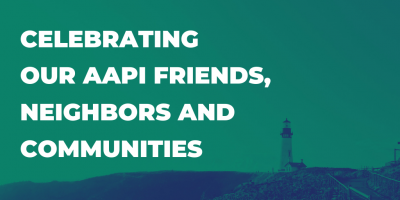By Lily Burnett, Lou Ocampo, and Jasmine Zimmer-Stucky

The month of May is recognized as Asian American and Pacific Islander (AAPI) Heritage Month. AAPI Heritage Month marks a time to acknowledge the accomplishments and contributions of our AAPI communities to the United States and beyond. It is also a time for 1000 Friends to acknowledge the injustices the community has endured, particularly in relation to land use planning in Oregon, so that we may all work together to address and redress injustices, and do better going forward.
The uptick in racist violence against the AAPI community over the past year is a tragic reminder of the importance of AAPI Heritage Month. Present-day racism and violence are sadly not new to the AAPI community in America. It’s rooted in our Nation’s – and Oregon’s – history of exclusion, discrimination, racism, and xenophobia against Asian Americans.
Many Oregonians can still find evidence of discriminatory housing policies in the deeds and titles to their properties, known as racial covenants. Black, Indigenous, and People of Color (BIPOC) were legally restricted from owning homes. Racial covenants also prevented many BIPOC families from attaining the socioeconomic benefits attributed to homeownership. The Supreme Court of the United States struck down the legality of these covenants in 1948, but it was not until the Fair Housing Act of 1968 that they became illegal. What the Fair Housing Act wasn’t able to do, however, was completely stop discrimination or eradicate exclusionary zoning laws – some of which are still on the books.
Asian communities in Oregon have been instrumental players in the natural resource economy for well over a century. At the turn of the 19th century when canneries lined the Columbia River in Astoria, well over a quarter of the workforce was Chinese. In the early 20th century, the Hood River Valley – famous for orchards and berries – was home to a growing population of Japanese farmers. In a dark moment in Oregon history, the Ku Klux Klan successfully lobbied the Oregon legislature to pass the Alien Land Law in 1924. The measure prohibited Asian immigrants from owning or leasing farmland. The Alien Land Law passed the House with only one “no” vote and received unanimous support in the Senate. More injustices were to follow, with another being the forced internment of Japanese Americans during WWII.
Oregon also has some unique and proud connections to the celebration of AAPI contributions to our American story. Oregonians helped Patsy Mink become the first Asian American woman to run for President of the United States. She was already the first woman of color and the first Asian American woman to be elected to Congress, representing the State of Hawaii. Hawaii did not have a presidential primary election, so in 1972 Oregonians rallied and put her on Oregon’s Democratic primary ballot. George McGovern won the nomination that year, but Mink went on to serve in Congress through 2002, leading the way for initiatives such as the Early Childhood Education Act and the Title IX Amendment of the Higher Education Act.
At 1000 Friends of Oregon we recognize that without knowing the history of discrimination in Oregon we cannot effectively plan together for a better future. Our staff has been working with the Department of Land Conservation & Development on the passage of House Bill 2488 this legislative session. HB 2488 would require an update to our land-use goals to ensure that local governments adopt practices that center inclusion, environmental justice, and equity in land-use planning. This is one way we are working to improve our land use planning program and create a more equitable public process that not only invites diverse groups to the decision-making table but makes it a requirement to ensure that they are included and barriers to access are removed.
Acknowledging the accomplishments and contributions of the AAPI community in Oregon – along with historic and ongoing racism and violence – are necessary to advance equitable policies like HB 2488. To adapt the powerful sentiments of the Asian American theater group, East West Players: We will continue to do this work until we can all leave our homes, walk down the street, and participate in equitable land use planning processes, without fear or trepidation, but with joy.
P.S. We are grateful for the resources compiled by the illustrated timeline of Oregon’s Asian-Pacific-Islanders History compiled by Kyle Weismann-Yee for the Southeast Multicultural Center. This timeline was shared with 1000 Friends of Oregon as part of a racial equity training led by Rut Martínez-Alicea and hosted by the Oregon Food Bank. It has served as an invaluable resource for our staff over the past year.
P.P.S. For additional information on how you can support your AAPI neighbors, learn more from our partners at APANO.
